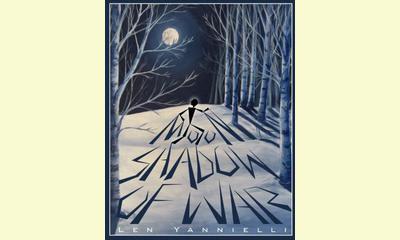|
|
Book Review of Moon Shadow of War; How a Young American became an Anti-War Activist
un article par David Adams
video: TV show
CPNN readers will enjoy reading this book about
the awakening of activism in a "typical" young
American faced with the Vietnam War in the 60's.
It is available as an e-book at Amazon.

click on photo to enlarge
As the author, Lennie Yannielli, says, "There is
no dearth of books on the Vietnam period on the
home front. . . . What was going on outside of the
student organizing epicenters of Ann Harbor,
Michigan and Berkley, California? Who was impacted
and in what ways? . . . How did it impact his or
her family, friends or work relationships? What
was it like for a young teacher up an industrial
river valley in Connecticut? It was my interest
in delineating and clarifying answers to those
questions that compelled me to write this memoir.
"Purveyors of the U.S. War in Vietnam constantly
talked of a “light at the end of the tunnel.” . . .
Young people, myself included, learned quickly that
the light at the end of the tunnel was a freight
train heading right at us."
The "freight train" was the draft, as Lennie was
continually threatened by the demand that he enter
the military and go to Vietnam to fight in a war
that he did not believe in, and from which is
friends came back wounded or dead.
"The U.S. War in Vietnam represented a bend in the
river we call life. That bend was a life-altering
turning point. It was like being in a kayak,
maneuvering rushing waters over class five rapids.
. . The U.S. War in Vietnam, and its opposite, the
anti-Vietnam War movement, colored everything.
Taken as one interpenetrating whole, it ran the
gamut from the choice of garments and music, from
how to wear one’s hair to overtly political
decisions like working on an underground
newspaper, from which demonstration to attend, to
what to do on Monday. Decisions from that period
still ripple through me. Why is that so? That is
what this book explores."
Eventually, Lennie became an activist against the
war, and as a consequence, like many in his
generation, he was fired from his job as a teacher
because his views and his activism threatened the
status quo in the small town where he was teaching.
Lennie concludes with a call to each of us to
become anti-war activists. "We have to look among
ourselves to bring about the change. No knights in
shiny armor are coming. The common people are the
agency. It has to come from our ranks, both the
leaders and the followers. We can call upon Henry
David Thoreau, Mahatma Gandhi, Fredrick Douglas,
Nelson Mandela, Martin Luther King, and Angela
Davis. They can give intellectual and spiritual
guidance. But it will take our physical presence
and full mental faculties. The baton of humanity
has been handed over to us. We have to find our
collective voice. We can do it. We have to do it."
|








|
DISCUSSION
Question(s) liée(s) à cet article:
Anger against injustice, Is it necessary for the consciousness development of peace activists?
* * * * *
Commentaire le plus récent:
As I say in my book review of Lennie Yannielli's memoirs about his :against the Vietnam War, this is an enjoyable book for all CPNN readers. Each reader will find something different in the book, as it is told very honestly with a "down to earth" style.
Personally, I was interested in a particular aspect of the book: to what extent was Lennie's anger against the injustice of the war an important factor in his psychological development as a peace activist?
This interests me especially because I wrote a psychology book some years ago about the stages of consciousness development in peace activists, using autobiographies of great peace activists like Martin Luther King, Eugene Victor Debs, Nelson Mandela, etc. I found that most of them described how their anger mounted against injustice to the point that they had to take their first anti-war action.
In Lennie's book, there are abundant references to the theme of anger as a motivational force for action. Here are some of them.
When he was called to appear before his draft board: "What they got from me was not only my indignation. It was the wrath of my generation."
When he learned that the US had just killed thousands of Vietnamese civilians by "carpet-bombing": " I could feel an extra dose of acid trickling in my stomach."
When looking at a photo of a mother fleeing the flames of war with her babies: "Every time I gaze upon that picture, it gets my juices flowing. It speaks to me. Do something. Write. . ... continuation.

|
|









